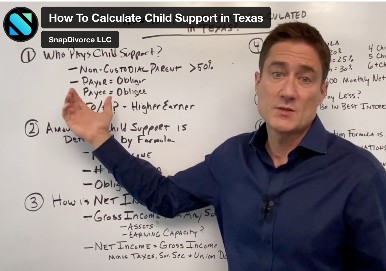
How To Talk To Your Kids About Divorce
Discussing your divorce with your children is an uncomfortable but necessary conversation. Research shows that how you have this conversation can have a lasting effect on your children. In order to minimize the traumatic effect of this conversation, you and your spouse should find a distraction-free environment to talk, remain calm, speak with all children together, avoid placing blame on one another, accept responsibility, and make sure your kids know that you both still love them.
HOW TO TALK TO YOUR KIDS ABOUT DIVORCE
Divorce is complicated and painful. It’s even more difficult when you have children. Your divorce will have as big of an impact on your children’s lives as it does on your own.
The Center for Disease Control considers divorce as an adverse childhood experience (ACE). ACE’s can lead to greater health risks later on in life. Your children will likely remember the moment when they were told you were getting a divorce for the rest of their lives. In a 2002 study determining the lasting effects of how children were informed of their parent’s divorce, one participant noted “It’s something that’s going to stick in my mind forever. I can’t remember much about the divorce, but I will never forget the room. I will never forget where my dad was sitting and what he was sitting on.”
For these reasons it is of vital importance that you attempt to make the conversation go as smoothly as possible, and help your children cope with the changes.
Pick A Time When There Are No Distractions
Similar to the first time you talk to your spouse about getting a divorce, when you have the conversation can be just as important as what you say. Choose a quiet place free of distractions. Find a time when you and all of your children are available and do not have anything to do soon. A weekend can work well as it will allow you to be around for the day or two after the conversation to help answer any questions that may come up later, or help your kids cope with their feelings.
Keep Calm When Speaking About Divorce
Just as important as when and where you have the conversation is how you act during the conversation. Divorce is a difficult process for all of those involved. You and your spouse will be dealing with a lot of emotions and may still be trying to process everything when you sit your children down to talk. It is very important that you do your best not to lose control of your emotions when telling your kids about the divorce. If you feel yourself getting overly angry or losing control, ask to take a pause in the talk and reconvene in a few minutes. This doesn’t mean that you cannot cry if you are upset––you are not trying to teach your children to repress their emotions, but rather to manage their emotions. Studies show that children can, to some extent, perceive the emotions their parents are feeling. Children exposed to a lot of negative emotions, such as their parents arguing and blaming one another for the divorce, are more likely to suffer from negative emotional behaviors such as anxiety and depression.
Tell All Your Children About Divorce Together
It is natural that parents want to do whatever they can to protect their children from pain. One way this inclination presents itself in divorce is when parents putt off explaining to young children what is going on. Do not do this. Even young children can sense when something is wrong. By hiding it from them you are more likely to confuse them. You are also not making yourself available to help them deal with their questions and emotions. Additionally, older children who are told first often feel that they must carry the burden of this secret. That’s not fair to them and will cause more pain in the long run. It is best to gather all of your children together at the same time to explain what is happening.
Present A Unified Front
While there may be animosity between you and your spouse, do your best to put it aside when telling your kids about your plans to divorce. Just as you are losing a partner, your children are losing their family as they know it. The process is going to be extremely difficult for them. One way to make it a bit easier is by telling them about the divorce together. This will help to demonstrate to your children that the two of you will continue to work together in the future to care for them.
Make Sure They Know The Divorce Is Not Their Fault
Do your best to stress to your kids that they are not the cause of your divorce. You do not want them to feel responsible. Further, make it clear that nothing they do will be able to get the two of you back together. You and your spouse should both accept responsibility for the divorce without trying to place the blame on the other. This will help make it clear to your children that the divorce is not their fault. You can tell them something along the lines of “We have spent a long time working to make our relationship better, but we finally decided we would both be happier apart. This decision has nothing to do with anything you did or said, it is solely about us.” You want to make it clear that the decision is out of their hands.
Tell Them You Will Still Be A Family
Explain to your children that while things will be changing you will both still be their parents. Let them know that both of you will still be there for them when they need you. The family is changing, not going away. You want to stress to your children that they do not need to choose between the two of you. They can continue loving you both equally, and you will both continue to love them.
Be Direct and Explain The Situation Honestly
Do not try to beat around the bush. Tell your kids openly and honestly that you will be getting a divorce. Explain to them what will be happening during the divorce process and after. Before speaking to your kids, try and think of all the things that will be changing in their lives and let them know about these changes. This may include things such as their living situation, whether they will stay in the same school, who will be taking them to and from school or practices, and when and how often they will be seeing each of you. The goal is to minimize the surprises that your kids will experience during the process, it is easier to cope with changes that they know are coming as opposed to having to deal with them in the moment.
Listen To Your Children
Once you finish explaining to your children that you will be getting a divorce and what will be happening moving forward, ask them if they have any questions. Try to answer any questions they have honestly without placing blame on one another. Additionally, at the end of the conversation ask your children how they are feeling. Your children may not react the way you expect. They may be angry, sad, happy, ambivalent, or any of a whole array of other emotions. All of these emotions are okay, do not try and force them to feel a certain way. It is important to find out how they are feeling so that you can come up with ways to help them moving forward. Follow up on this question once every week or so during the divorce process, so that you are aware of any changes in your children’s emotions regarding the divorce. They may not be comfortable enough to bring up changes in their feelings on their own.
Be Willing To End The Conversation
While it is important to have a thorough conversation with your children to explain the situation and answer any questions they may have, do not let the conversation drag on forever. When you feel that the main points have been addressed and you have answered your children’s questions as best as you can end the conversation. Give them time to go off and process the information on their own. That will allow them to develop their thoughts and feelings on the situation without feeling pressured by you and your spouse’s presence. Let your kids know that you are both there for them if they have any questions or thoughts during the process. Additionally, tell them that you welcome their input throughout the process and that it is important to let you know if there is anything you can do to make the divorce easier on them. Let them know that their feelings matter.
Related Articles

Don’t blow
everything for
the sake of
revenge.
Find out how SnapDivorce® can help you simplify your divorce.


